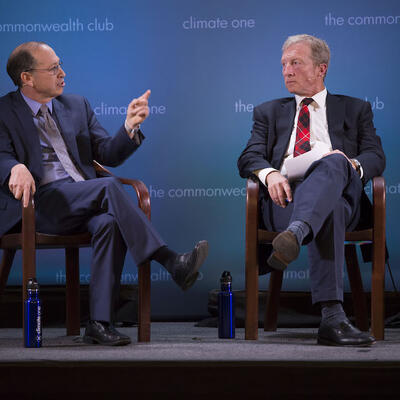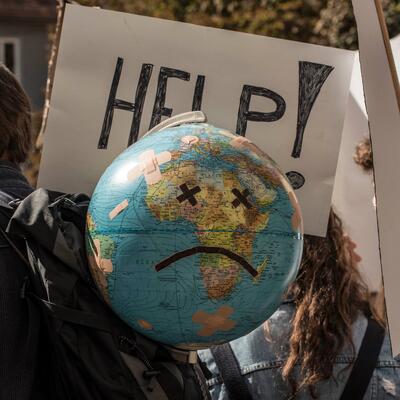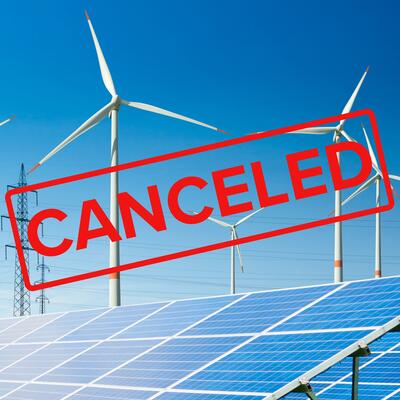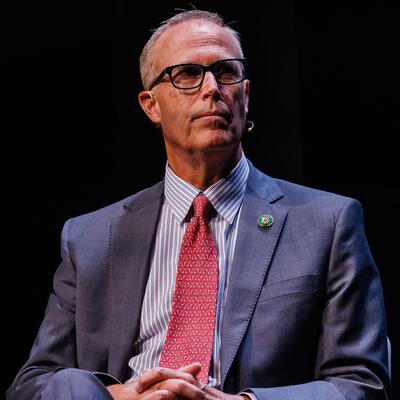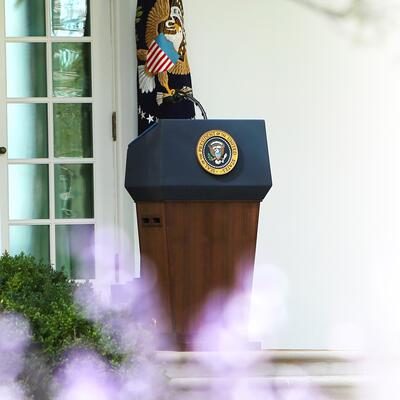
Big Ideas with Dan Esty & Andy Karsner
Guests
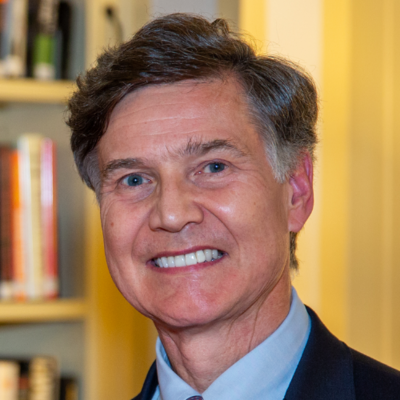
Dan Esty
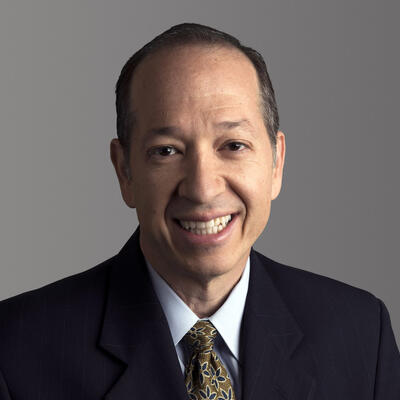
Andy Karsner
Summary
Does solving climate change mean re-thinking old top-down approaches and embracing big change at high speed? A half-century after the first Earth Day, some environmental advocates argue it’s time to challenge some of our basic assumptions about climate action.
“The original environmental framework... was designed in the 1970s in a world that was information poor,” says Daniel Esty, Professor of Environmental Law and Policy at the Yale School of Forestry & Environmental Studies, and editor of the new book, "A Better Planet: Forty Big Ideas for a Sustainable Future." “We’re now in an information rich world and one of the things that we can do differently today is track those harms and make people pay for them.”
Esty was part of the U.S. team that produced one of the first international climate agreements at the Rio Earth Summit in 1992. Nearly 30 years later, he and others have revised their thinking about top-down, government-centred approaches to climate action.
“Presidents and prime ministers don't actually have their hands on the steering wheel of a lot of the elements of society that determine a society's carbon footprint,” notes Esty. “There are lots of ways to go forward ahead of certainly national governments may be even ahead of what city and state governments can do.”
Both Esty and Andy Karsner, who served as Assistant Secretary for Energy Efficiency and Renewables under President George W. Bush, believe in the need to build an environmental coalition that can get majority support in Congress and the population at large.
“You're not ever going to get them to join a national coalition by saying, if only you had as much access to education resources tech companies and wealth as we had, you'd be as educated and you wouldn’t be running my life,” says Karsner. “That is not a winning argument politically.”
Like Esty, Karsner laments the polarization that has attached itself to climate over the last decade, particularly over the role of markets in nurturing climate solutions.
“We as humans have the opportunity in our collective communities to impose rules on the market for the market to serve us,” he says. “We are going to democratize the way people have access to problem-solving and enable bottom-up solutions to accelerate at an unprecedented pace.”
Related Links:
A Better Planet: Forty Big Ideas for a Sustainable Future
National Oceanic and Atmospheric Administration
Yale School of Forestry & Environmental Studies
Hip Hop Forestry by RaShad Eas
Planet (formerly Planet Labs)
Full Transcript
Greg Dalton: This is Climate One, leading the conversation about energy, the economy, and the environment. [pause] A half-century after the first Earth Day, progress on climate has been almost unbearably slow.
Andy Karsner: The kids are rightfully impatient. They don't like an outdated U.N. process. They don't feel like we have another three decades to move.
Greg Dalton: Even as they embrace the climate challenge, national governments have struggled to implement top-down solutions.
Daniel Esty: Presidents and prime ministers don't actually have their hands on the steering wheel of a lot of the elements of society that determine a society's carbon footprint.
Greg Dalton: It is time to question our (most) basic assumptions about how to solve climate change?
Andy Karsner: We are going to democratize the way people have access to problem-solving and enable bottom-up solutions to accelerate at an unprecedented pace.
Greg Dalton: Big ideas for the climate challenge. Up next on Climate One.
Greg Dalton: Hi everyone, I’m Greg Dalton, Climate One founder and host, and I’ve been interviewing top experts on all things climate since I started the Climate One podcast over a decade ago. But now, you’re the one I want to interview. Climate One would love your honest feedback on a survey we’re doing to better understand our audiences. We’re offering everyone who participates the chance to win one of eight $250 gift cards by going to climateone-dot-org-forward-slash-survey.
We value your opinion. Thanks again for taking our brief survey. Again, that’s climate-one-dot-org-forward-slash-survey.
Music: In
Greg Dalton: Does solving climate change mean re-thinking old top-down approaches and embracing big change at high speed? Climate One conversations feature oil companies and environmentalists, Republicans and Democrats, the exciting and the scary aspects of the climate challenge. I’m Greg Dalton.
Richard Nixon: The environmental agenda now before Congress includes laws to deal with water pollution, pesticide hazards, ocean dumping, excessive noise, careless land development, and many other environmental problems.
Greg Dalton: When President Richard Nixon announced the formation of the Environmental Protection Agency in 1972, it marked a new commitment by the U.S. government to addressing climate. But a half-century later, some argue it’s time to challenge some of its basic assumptions.
Daniel Esty: The original environmental framework was designed in a world that was information poor. We’re now in an information rich world and one of the things that we can do differently today is track those harms and make people pay for them.
Greg Dalton: Daniel Esty [ESS-tee] is Hillhouse Professor of Environmental Law and Policy at Yale School of Forestry & Environmental Studies and Yale Law School. Green to Gold, the 2009 book he co-authored, shaped corporate sustainability and remains a seminal work in the field. He's editor of the new book, A Better Planet: Forty Big Ideas for a Sustainable Future.
Andy Karsner: No matter where you are, no matter what you, do climate change risk is coming in some gradient or form.
Greg Dalton: Andy Karsner served as Assistant Secretary for Energy Efficiency and Renewables under President George W. Bush, and he’s highly active as an energy investor and advisor. He’s a senior strategist and space cowboy at X, Alphabet’s moonshot factory formerly known as Google X. Esty and Karsner both worked in Republican presidential administrations. But over the last two decades they’ve been re-thinking the role of government and markets in solving climate change. I began our conversation by asking Dan Esty about the role he played in the 1992 U.N. framework convention that kickstarted the international climate effort.
Daniel Esty: So I was part of the U.S. team that worked for a couple of years to bring together that kind of emerging sense that we needed to do something about climate change building on the science that had been consolidated by the intergovernmental panel on climate change. And it took several years with negotiations every three months for a couple of weeks the shot to bring together an initial agreement of framework convention as we called it, and that was worked out in the spring of 1992 and then signed by presidents and prime ministers at the famous Rio Earth Summit in June of 1992. And that launched us on the mission we’re on to try to respond to climate change and frankly it was the only thing we had in place in the United States for quite a number of years until the 2015 Paris agreement.
Greg Dalton: And compare that approach the Rio, the idea of how the theory of change for how climate change would be addressed then and now.
Daniel Esty: So I think the view in 1992 and it was a broad consensus about people who are thinking about the problem of climate change was that we needed top-down action. So, national governments would set the framework and really more than set the framework tell people what to do. And we thought that, you know, frankly once that there was the commitment in place and that people were all around the world arguing for action we would make things happen. So I actually negotiated that agreement and then left government thinking I'd done the job. 20 years later I kind of woke up and realize wow we haven't done it. And I think what I began to argue for going into the 2015 Paris conversation that’s now produced the Paris agreement was a recognition that presidents and prime ministers don't actually have their hands on the steering wheel of a lot of the elements of society that determine a society's carbon footprint. So we needed to build in a bottom-up strategy alongside top-down frankly a national government approach alone is not enough and many ways not even the right place to start. So we now know that governors, mayors, corporate leaders, national leaders and all kinds of organizations have to be part of the conversation and frankly have to deliver in significant ways. And I think the core of the strategy in the 20th century was command and control. The government would tell people not just what the target was but sometimes what the specific technology that they had to deploy company by company industry by industry. And what that did was lock in answers sometimes reasonably good one sometimes not so good. And it left us without a strategy that had much space for innovation. So I’d become convinced and that's my own essay in this new book is around how important it is to structure our policy approach in a way that spurs innovation and with innovation spurs investment and the flow of funds to these new approaches. And so I think we've learned a lot in the intervening now three decades since we first were putting together that original 1992 agreement, some of which is captured in the 2015 Paris agreement but there's more space for innovation breakthroughs and frankly new approaches.
Greg Dalton: Andy Karsner, one of the stepping stones of the Paris agreement was the Bali roadmap, you are a key negotiator in that. So tell us your role in the Bali Road Map and how that kind of went to Copenhagen in Paris.
Andy Karsner: Right. Well, first of all, Greg, thanks for having me back. Last time I was here, we were sitting with Tom Steyer it was right after Paris. So you might run for president one day Daniel and that would be good. But you recall we had those reflections on Paris and I was sort of happy to say okay, you know, we're done we turn the corner as a planet and everyone except for one country or two I think Saudi Arabia, Nicaragua, said this is in fact happening. And that after three decades represented progress. These cops that people talk about conference of the parties were meant to be implementations of the work that Dan and Bill Riley in the Rio Summit produced way back then to say we have this framework convention now let us implement. And it went awry at a famous one called Berlin a few years later where the Chinese and the Indians succeeded in saying we will never be a developed country. And that then got embedded into Kyoto and it was a big split amongst the people in the Clinton administration and who are working for Vice President Gore and you'll recall, the Kyoto came back as meant to be the seminal implementation and the Senate rejected it I think 98 to 0, something like that.
Daniel Esty: Never even put it up in the poll.
Andy Karsner: Yeah, they did a straw poll.
Daniel Esty: They had something called the Byrd-Hagel amendment, which before the president could even propose it was put through that said, don't bring us a treaty, unless the developing countries have signed on.
Andy Karsner: So the net of it was, it was fairly dead on arrival. Unfortunately, a young, naïve governor with a Texas accent and the controversial election stepped into the White House and said, nope it's dead, deader than a doornail or something good in Texan we’d say stepped in dog doo-doo back home. And my mentor, George Shultz had said it wasn't that George W. Bush rejected Kyoto it's that he rejected it with such flourish. And in fact, that's let us into this long polarized period of beginning to talk about what had been a scientific consensus across our country in the way that is Pluto a planet or not, you know, we talked about these things in a sensible way. It led us into whose tribe are you in, are you a believer or are you a denier, are you protecting the oil interest are you protecting the solar panel guys. We have gotten worse and worse and more and more polarized. But prior to that when the lines were closest when a consensus was last evident as Pew’s research would show in 2007, 2008 we were able to rejoin the global consensus with the Bali Road Map that was the significance of it was that after a 10 year hiatus and not being part of the global community, we rejoined the United States took a leadership role. We created something called the major economies meetings which the Obama administration then took on and Todd Stern and Jonathan Pershing did their work, unfortunately, got detoured at Copenhagen, but it led to Paris. And then the question is so now what, you know, everybody's in Madrid the kids are rightfully impatient. They don't like an outdated UN process governing them with a 20th century thinking about top-down mechanisms that require 180 countries all agree at once they don't feel like we have another three decades to move. And to me that's the importance of Dan’s book is taking experts and saying we are going to democratize the way people have access to problem-solving and enable bottom-up solutions to accelerate at an unprecedented pace. Fundamentally, if I was taking away your book that would be my take away.
Daniel Esty: And I would say even beyond that we don't wait for government. There are lots of ways to go forward ahead of certainly national governments may be even ahead of what city and state governments can do. And I think one of the steps forward of Paris was also to say we’re not gonna have everybody have the same standard. We’re gonna let people choose a goal commit to a goal and then have a diversity of ways to pursue that agenda and move things forward. And I think that's progress, you know, people will say well it doesn't add up to enough and that’s true. But it does get everybody on the playing field. And of course the big flaw of the original 1992 framework convention was that it only invited a subset of countries to actually commit to action. So the so-called annex one list of countries forty something industrialized nations, and everybody else was asked to play if they wanted to or they could sit on the sidelines and almost everybody chose to sit on the sidelines.
Daniel Esty: Well, I’ve myself been testifying before the Congress recently in the month of December and was asked to sort of lay out a pathway that the country might follow. And of course there's Democrats and Republicans in the conversation. And I won’t tell you that the Republican stood up and cheered during the testimony, but a number of them said, would you come back to my office later this afternoon and spend a little time with me thinking about what a Republican approach to this problem might look like. So I can tell you there are conversations going the minority leader in the house is convinced being as he is from California that the future of the party depends on having something to say about climate change. So Kevin McCarthy is on this team that's thinking about it. And frankly, I think you will see not this year not in 2020 but in 2021 a shift in the dynamic of this conversation. You will see Republicans coming back at climate change and frankly I think back to the sustainability agenda more broadly with the recognition that from an electoral point of view to just be against it all is not very viable over the long-term.
Greg Dalton: Andy Karsner. I feel like I've heard this before. 2015 when Pope Francis came to Washington DC there were 10 Republicans, who then took what was a bold move, Chris Gibson, Republican of New York and 10 Republicans came out of the closet on climate and said, we think something ought to happen on climate. Chris Gibson is now no longer in Congress so we've been hearing for years about a prison break Republicans going to come out and yet with what we've seen with the party doing recently and a president who’s vehemently opposed to climate is that realistic to think that it’s gonna happen in 2021 or 2020?
Andy Karsner: Not while this president is in office. You know, I’ve also testified on the Hill, I agree with what Dan has said there are Republicans in Congress that it's not sort of, well, I totally understand the science now I'm all with it I just got caught up sorry about that, memory lapse, whatever. It really is closer to look, the red states are getting pounded by hurricanes. We can no longer insure our homes, our municipalities are going broke. We don't understand why water is in the street in homes in Florida and we are out of reasons to protect the oil industry to figure out what to do because our votes are account. So there's nothing that motivates in DC like fear and fear is hitting the Hill because except for California and fires almost every other immediate impact of climate change is happening in a red state.
Greg Dalton: And suburban districts who are key to the electoral strategy.
[00:16:36] Andy Karsner: Absolutely. And so I’d separate that from the question of executive administrative leadership. This president, this issue is hopeless. There is not, you know, you can invite Gore to the office and, you know, and have Ivana rollout some ideas of some other soft meetings. But the reality is this, you know, when Bush was the Antichrist and eats his children who want to destroy the world back in that day of mythology, it was a difference of opinion. It was simply we would like to do it this way as opposed to that way. It wasn't this doesn't exist it's a hoax the Chinese are trying to take our jobs. This president lives in a different place and more important than this president as with any administration he’s only the face of a franchise, you know, the real question is who's the team beyond the sort of nepotism and Mafioso he’s got himself surrounded with. The real question is who is capable, competent has the acumen, experience relevance diplomacy to execute anything in those jobs. And the answer almost across the board is I don't know nobody really knows who these people are. Yeah, I know the guy who sits in my office managing the two billion-dollar applied science portfolio for the federal government our national labs is a guy who wrote a book about how all this stuff is a waste of money and fraud and abuse. So this is a particularly ideological bent gang of folks and --
Greg Dalton: You’re still a Republican?
Andy Karsner: Wait, what a good question. I’m a Bill Riley, George Shultz, Ronald Reagan Republican to be sure. I am a Republican from the party of Lincoln there is nothing that this con man and Abraham Lincoln have in common.
Daniel Esty: So I think what I see happening is what you just suggested but went by very quickly. So I wanna come back and focus on it. And that is what I see now is that the folks that were saying it's all a hoax are of two groups. One, who are staying with it and others who were saying you know that was never really the problem. The problem was the policy framework that our Democratic friends wanted to put out or the environmental community want us to follow. And if you can tell us that there are other ways to achieve these goals ones that are more focused on harnessing business innovation finding ways to engage people in breakthrough thinking and get beyond the sense that the answers are all gonna be more government programs more dictates from government more mandates, more command-and-control regulation, then we want have a conversation. And frankly that's what I think The Better Planet book is about. Let's get beyond the debates of the past and look forward and dig into the substance. And as I talk about this book out across the country, I see an enormous desire to get into the substance get beyond that tough politics and start to move forward.
---
Greg Dalton: You’re listening to a Climate One conversation about big ideas for confronting the climate challenge. Coming up, getting the people with the most at risk in a destabilized climate to sign on to the solutions.
Andy Karsner: You're not ever going to get them to join a national coalition by saying, if only you had as much access to education resources tech companies and wealth as we had, you'd be as educated and you wouldn’t be running my life that is not a winning argument politically,
Greg Dalton: That’s up next, when Climate One continues.
---
Greg Dalton: This is Climate One. I’m Greg Dalton, and we’re talking with Andy Karsner, a former official in the Department of Energy under President George W. Bush and a space cowboy at X, the moonshot factory affiliated with Google. And Dan Esty, Professor at Yale and editor of the new book, A Better Planet: Forty Big Ideas for a Sustainable Future. Thomas RaShad [ruh-SHOD] Easley [EEZ-lee] is assistant dean of community and inclusion at the Yale School of Forestry and Environmental Studies, and a contributor to Dan’s book. He also raps under the name RaShad Eas [EEZ], and he’s coined the term “hip-hop forestry” to describe what he does.
[Start Playback]
Thomas RaShad Easley: I’m a part of two communities that in my opinion don't come together pretty often and there’s hip-hop and there’s forestry.
[Music Playing]
I don’t talk about climate change only in terms of forestry I talk about them in my music. I talk about them in my poetry. I go to places where people who are just like me in some regard and then at the same time or different times I go to place where people are completely different than me. So I show up in those faces and have those conversations where most of my colleagues don't even go. I do what my colleagues need to do if they really wanna bring people into this discussion. You have to build a relationship first. We have to make the time to do that. We have to learn what they’re going through then we start to talk to them about climate change. Because you’re talking to them about change and how it’s impacting them.
I think it’s a mistaken method is to take people out of their environments and take them on hikes and take them to forests and take them to mountains and different things like that, you know, and then just hope people will fall in love with it. That’s what the forest done with me and they done it with a host of other people or colleague, you know, let’s give them scholarship and then we just throw them out west somewhere. No. What you should do is you should show people the beauty at home. Show them how they exist or help them understand their existence in their home places. And even though I was in the biggest city in the state of Alabama I grew up gardening with my grandparents.
If you don’t know how to communicate with people then you definitely is also part of the problem. So regardless if you wanna change, save the planet and that, if you can’t talk to the people who are cohabitating with you on this planet, then you’re not really helping the situation at all. You actually also making it worse.
[End of Playback]
Greg Dalton: That was Doctor Thomas RaShad Easley, assistant dean of community and inclusion at the Yale School of Forestry and Environmental Studies. The music you heard was his song Hip-Hop Forestry. Dan Esty, first of all, pretty cool that the school has such a Dean and addresses the idea there, crossing that race and class divide you don't take people throw people of color into nature and say here love it, you got to bring it to them.
Daniel Esty: Well, first of all it’s a joy to have his essay in this collection because I think it goes to an issue that has been under the surface and yet critical. And that is how do you build an environmental coalition that it can obtain a majority support for some of the things we all now would say need to be done. And I think as long as the conversation was all conducted in the language of upper middle-class, suburban white folks, you are gonna leave a lot of people out of it. And so Thomas is drawing on and bringing into the discussion folks who never would've been part of it. And so I'm thrilled to see that. And I think what he's saying is a pretty profound message and that is, you gotta go to people on their terms not make them come to you on your terms. And I would argue that there's even a deeper message there. And that is we're gonna have to respond to a whole set of communities who are doubtful that their life is gonna be better in a sustainable future better as we address climate change. And I think we have been systematically under attending in the environmental arena broadly to transition strategies. How do you help people who are worried about change doubtful that they're going to survive that kind of charges that Andy and I wanna make people pay for the harm they're causing, you know, the internalized in these externalities. And I think this is got to be part of the conversation.
Greg Dalton: Andy Karsner, yeah, there’s a concern in the term just transition that the people who are harmed and left behind in a fossil fuel economy are left behind in a green economy that just serves coastal elites and people who can afford it. Is that fair?
Andy Karsner: Yeah. I think we’re seeing it right now. I think we’re seeing it and even in the most progressive places like California, we don't actually have a good handle on the governance or design to manage the just transition that we would desire. I mean fundamentally most of the things that exist in our commons if they’re natural commons the harm is going to affect this equitably. Therefore, the participation the stake holding in trying to solve for the harms needs to be accessed equitably. We haven't design that as yet and that's why somebody in Palo Alto can pump sunshine into their Tesla with no, or a tax credit for their Tesla as if they weren’t gonna buy a hundred thousand dollar car if they didn’t have a 7,000 dollar tax credit and they can have avoid the road taxes avoid gas taxes avoid everything else leaving that for people who that 7,000 dollar credit won't even cover bus fare for a year of commuting. So we have massive inequities being induced even as we’re seeking to catalyze a green economy. Nothing worse than what is happening right now with the wildfires that, you know, fundamentally, we have a situation where unbeknownst to California is people are mapping where the lights go out. And when I map where the lights go out and the fact that California is defaulting on a hundred-year promise of a social compact to deliver a just, equitable, on time, reliable on-demand power supply even before it’s a revised social compact and made green we’re defaulting on the original one that allowed for these monopolies to take place. So what's happening is people’s property values are getting hit. Those property values get hit, the tax base goes down. The property values get hit the tax base goes down they become uninsurable properties. These things are cascading through California and meanwhile we have a utility that's in bankruptcy just seeking how to service its equity investors. I mean we have a real conundrum and that's in the most progressive state that's before you get the states that aren’t thinking about the transition at all. So this dislocation being caused economically is something very real and requires us to be proactive in design in the same way that FDR or TR, you know, Teddy was proactive in design and this is a Teddy Roosevelt moment.
Daniel Esty: So Greg let me just jump in on that. Because I think in the spirit of driving this conversation to the specifics that we need to take seriously and I would encourage this audience that probably cares about determining and delivering and supporting this transition to a clean energy future to a real response to climate change. So three communities. One, are the folks whose budgets are already so tight the prospect of paying more for the harm they're causing the fossil fuels they’re burning is a big shock to them. So I think we have to have a strategy for the lowest income bracket. Second of all we have to have a strategy for the parts of the country that are fossil fuel dependent and not well-positioned to transition and that sometimes now called the West Virginia problem and it's gotta be taken seriously. And then third and I think this is the piece that's the silent part of the story, but critical is that it turns out that rural people are much more energy intensive than city people. And so if we’re going to have a transition I think one of the things we need to pay attention to is if we collect the money of these harm charges that I'm calling for that I think there's growing momentum for. I think we have to redistribute that money not per capita not to every person, but I think we should send it to the states. And we should send it to the states with a kicker supporting extra payments to the states with the poor people that are most affected. The fossil fuel communities that are gonna be jarred and to the rural communities they’re gonna have to regear themselves. And I think that would go a long way to help build the political momentum to get over the hurdle and get something done.
Greg Dalton: That sounds like the rural states, though are the red states and the urban states are the blue states. So is that a blue, red wealth distribution strategy?
Daniel Esty: You know, my view is, you’re gonna have to get a political coalition built here and the folks that are hesitating today are red state elected officials. And you’re gonna have to develop a strategy to get them on board.
Andy Karsner: So that's a yes, that, you know.
[Laughter]
Yes, you know, these blue states California and New York are gonna have to figure out a way that people are benefiting from climate transitions across the center of the country. You're not ever going to get them to join a national coalition by saying, if only you had as much access to education resources tech companies and wealth as we had, you'd be as educated and you wouldn’t be running my life that is not a winning argument politically, okay. So you've actually got to go with the generous outreach of my fellow Americans. How do we rise together, okay and not demonize you for your history in the ag belt or the iron belt or the energy belt. How do we rise together in the transformation that we must have at the fastest possible pace.
Greg Dalton: If you’re just joining us we’re talking about at Climate One today about risk and big ideas and climate change. I'm Greg Dalton. My guests are Dan Esty, Professor at Yale School of Forestry and Law. He’s editor of the new book, A Better Planet: Forty Big Ideas for a Sustainable Future. And Andy Karsner, is a former official in Department of Energy under the second President Bush and a space cowboy at X, the moonshot factory affiliated with Google. And Dan Esty, it’s been quite a while since we’ve seen a grand bipartisan bargain in this country may be, you know, there’s recently some deal on criminal justice sentencing there's been a few of them. But since the days of McCain-Feingold grand bargains. Is that still possible in today's divided politics and is it necessary to get real action on climate that goes across handoffs between Republicans and Democrats? Because this climate policy has to endure handoff change of power.
Daniel Esty: So let's start with the necessary I think it's essential. And I’m gonna offer something and it’s truly counterintuitive. Transformative change does not come from the extremes, it comes up the middle. Because what makes it transformative is not that it happens for a moment but endures that it's around five and 10 years later after the political pendulum swings. And frankly the last major piece of environmental legislation, I would argue is the 1990 Clean Air Act. And I’d like to test the students at Yale on what they think the final vote the United States Senate was on the 1990 Clean Air Act. I see at least one person in the room who probably knows the answer to that and we won't let Bob Grady provide the answer here. But the answer and I won’t --
Greg Dalton: Just to clarify this is the first President Bush in the White House.
Daniel Esty: First President Bush in the White House. So we have a Democratic Congress president is Republican we are coming together on a bipartisan basis and the B students at Yale who never experienced anything other than political division of the deepest sort are sure there was 51/49. The A students say, oh no, no, it takes 60 votes to clear the threat of filibuster in the Senate it was probably 60/40. The answer was 89 to 11. And it was a moment where by the way, and having been there working on this issue again with a broad team we lost equal numbers six and seven or five and six off Democratic Republican side. So it was truly bipartisan. And what that meant was that as we began to roll it out implement it and by the way it’s still being implemented it's not fully done. But over the next decade both Republicans and Democrats came together to fix the little mistakes that were built in. And anytime you take on transformative change in this case we’re redoing the kind of foundations of industry in America and the next change that we’re talking about is re-laying the energy foundations of society you will get things wrong. And if you've done it on a partisan basis as soon as the other guys take power they’re gonna say, look at how these guys screwed it all up let's undo what they did and just pull it back. So I think necessary absolutely. Now your second question was is it possible. And I think that's a harder question. Not I think in the current political moment I have no hope that in the coming year we’ll see anything. But I think in the not-too-distant future there is a prospect, but it is only a prospect if we get to what I sometimes call the radical centrist solution. Which is radical and that is gonna be transformative but it has an ability to attract a broad base of political support. My core number is 70% support. You can't do it if you've got a deeply angry defeated side of the spectrum.
Greg Dalton: Andy Karsner, that's actually happened in California. We've had that consistency across Republican and Democratic administrations. I see that happening in this I see little chance of that in Washington. A lot of chances of that happening at the states. So talk about most of the energy that goes into American homes and businesses are regulated at the state and regional level. There is state action that is crossing the party lines like Dan said just not in Washington.
Andy Karsner: Well, I’m gonna go there I’m not gonna avoid that. But I got to correct Dan for the record because I told him earlier that energy legislation always has environmental consequence and environmental legislation always has energy consequence. So I would say the last bipartisan omnibus comprehensive legislation was at 2007 Energy Independence and Security Act. And you’d say well, that was just energy. Well, maybe except for the phase out incandescent lighting and it gave the federal government a standard of 30% emissions reduction. Gave us renewable fuel standard, you know, created bins in our vehicle mileage that the Obama administration used to incorporate electric vehicles and so forth and it gave us 10-year runway on the production investment tax credit, etc. The common characteristic of both of those and they shouldn’t be 15 and 17 years apart now we're 15 years past that. It shouldn’t be that because we should be having a dynamic adaptive legislative leadership that is sufficiently attuned to the capacities of society and all the sectors of society and technology, finance NGOs, etc. that it is regularly modifying itself in an adaptive way to stay ahead of the curve. But we wait for these fifteen-year things in our case it was $147 oil and two big hurricanes that allowed us to do it, okay. We can't wait for that but what Dan is stressing that it’s absolutely correct is that our aspiration in that legislation was not on twisting the 51st vote and cutting a special deal. It was not finding how to wait for the next election and have our party lead. It was accepting that Nancy Pelosi's party was running the house and even with the different parties in the Senate we could build the coalitions for two thirds majorities on both sides because the goal was to be judiciary proof and to provide investors, entrepreneurs, innovators, farmers society at large with a predictable signal and runway that was durable with sufficient longevity to make real change. And that's what happened in the last decade but we need a refresh because we didn’t have legislative artificial intelligence machine learning the Internet of things cloud compute and sensors we didn’t have all that. And so Washington again is got to get it tune, you’re right, that they’re not leading they’re lagging and if you're going to find a leadership you're going to find it amongst these governors who care first and foremost about economic development and the safety and security of their citizens. So even in some of these red states, North Carolina and others you're finding very aggressive push outs to say how do I get that new manufacturing base here. How do I stimulate that economic activity, what happened right in California. How do we bring it to New Mexico. We have 13 states right now that have already gone to that have followed California's zero mission 2045 mandate. So that's having like wildfire, right. And so we’ve got to take very seriously the learning laboratories in the states because that is in fact where the leadership is occurring because they’re much more tune to the economic development locally.
Daniel Esty: I would say that we’ve got lots of evidence that governors are getting things done. And frankly they can be done on a bipartisan basis that holds together as party leadership changes. In Connecticut I worked to set up the first in the nation Green Bank to ramp up the flow of private capital using limited government money to leverage those funds to really take energy efficiency to scale renewable power to scale in a way that couldn’t be done with a limited government money. And, you know, that package came together and ended up getting not just Democratic majority but got every single state senator in the whole state of Connecticut 36 out of 36 every Republican as well as every Democrat. And out of 151 state representatives all but five voted yes. And of the five that voted no, those five that voted no three of them later said, oh I meant to vote yes it was late at night I didn’t know what button to press. And so it turns out when you actually drive something at conclusion it's going to work and it has worked it scaled up the flow of money to energy efficiency and renewable power dramatically and you're getting seven dollars a private capital for every one dollar of government money in the system, you know, everyone’s in favor of it. But that's where I think the answer to why we need to move forward is in this idea that you can be bipartisan, you can get people to come together with the right policy framework.
---
Greg Dalton: You're listening to a conversation about big ideas for confronting the climate challenge. This is Climate One. Coming up, fixing capitalism.
Andy Karsner: The market will work. If you're trying to solve for climate change, the market will eliminate humans. And if that happens, you will probably return to equilibrium okay, but that's not a market response I would like to have.
Greg Dalton: That’s up next, when Climate One continues.
---
Greg Dalton: This is Climate One. I’m Greg Dalton. Climate One records many of our conversations with a live audience at our modern and green new home on the waterfront in San Francisco. When you are in town come check us out. Our programs are open to the public and listed on climateone.org. [pause] We’re talking with Andy Karsner, former official in the Department of Energy under President George W. Bush and senior strategist at X, the moonshot factory affiliated with Google. And Dan Esty, Professor at Yale School of Forestry and Law School, and editor of the new book, A Better Planet: Forty Big Ideas for a Sustainable Future. Another contributor to Dan’s book is Monica Medina [muh-DEE-nuh], a former official with the National Oceanic and Atmospheric Administration or NOAA, which oversees the National Weather Service. With extreme events rising, she says the federal government should create a new service that recognizes the difference between weather and climate.
[Start Playback}
Monica Medina: Climate is what you expect and weather is what you get. So the difference is climate is thinking long-term what are the average temperatures what is it usually like outside this time of year. And then weather is actually what you get. And right now we have a fantastic group of public servants who do their best to predict the weather including the most extreme weather events that we’ve seen in recent years. But they are not really set up to do the kind of seasonal interannual and targeted forecasts we’re gonna need for the climate changes that we’re gonna be experiencing in the future. Things that would help farmers or the insurance industry or just average folks get ready for the climate in the months, weeks and years ahead. We need to create a National Climate Service within the National Weather Service in order to better prepare us for the strong storms all the environmental changes we’re gonna be experiencing during climate change from droughts to sea level rise to storm surge, hurricanes, fire. We need more data and we need more supercomputer time to crunch the data and we need then the scientists to work on products that will help people. Right now we have small climate service offices scattered around the country. It’s dozens of people not the thousands that we probably need. Lots of people have talked about the need for this service in fact NOAA has studied it extensively and had come up with lots of options that we were considering at the beginning of the Obama administration. And we just never were able to get the funding from congress. There’s a lot of study about how we save money by adapting and by preparing. But there’s more than just having emergency response ready. It is how do we change where we build things, what we build the way we build them. Where we develop, where we don’t, how we create natural ways to defend ourselves without the kind of climate forecasting that we need we won’t know where to do it.
[End Playback]
Greg Dalton: Monica Medina held senior positions at NOAA under President Obama and President Clinton. Dan Esty, she wrote a chapter in your book. Seems like if we can't get something so basic and nonpartisan as there’s a joke going around, we don't need the National Weather Service we have the weather channel. Well where do you think the weather channel gets the data, right?
Daniel Esty: It’s beyond belief that people could offer that but it tells you the kind of moment we’re in. And frankly it’s even worse there's kind of a hostility to expertise to science to data to analysis. So I think Monica’s argument is essentially correct and I think more broadly, there is a moment coming where we’re gonna go back to science as critical to decision-making not just in the environmental arena or energy arena but broadly. And frankly the expertise is a good not a bad thing.
Greg Dalton: Andy Karsner, there is a company actually some ex Googlers came out and formed something called The Climate Corporation, which was using scientific data to look at crop risk that sort of thing. It was eventually bought by Monsanto. This raises the question for me whether corporations will fill a void left by government not really doing the job that it used to do and what is that mean when profit driven companies kind of are in charge of some of the data that used to be provided as a public good by government.
Andy Karsner: Well, I'm not fearful that private companies are availing data. I mean, I think that data is here there is we have data abundance. We might even have data excess what we have is a deficiency of data distillation that can yield the relevant insights in a timely manner that can shift the way we think about capitalism that can shift our imaginations so that we have new indicators to trade upon. Because fundamentally, this is all about a trade in risk management. If it’s Monsanto it's about what is the crop yield. If it's an insurance company it’s about what's the probability of a storm or the actuarial life of a property relative to whether it's in a fire zone. If it's Larry Fink at BlackRock it's about what's the real property asset value of all these shopping malls that I own and how close to the seashore are they, etc. No matter where you are, no matter what you do climate change risk is coming in some gradient or form. And for some of us it's coming much faster. We need that data to get over the legacy antiquated models which are statistically erroneous because they are all looking at the rear view mirror and trying to extrapolate empiricism. Empiricism won't work where we're going. We have to have stochastic dynamic modeling that's informed by this data that's distilled appropriately and then you apply machine learning and artificial intelligence to think faster, right. The machines -- we’ve cross the lines, the machines that have come out of this Bay Area and are all over the world think faster they process better it's never going to change again. What they can't do is think higher or feel more deeply. And so we have got to have that human spirit to have sufficient empathy and understand the real damage that is occurring in real people's lives right now and apply that with deliberative design.
Greg Dalton: Dan Esty, you’ve written a lot about corporate motivations. Recently we’ve seen the Business Roundtable come out and say, we need to kind of tinker with capitalism a bit not challenging shareholder primacy. Larry Fink, you know, Andy just mentioned talking about risk and recently one that caught my eye was Jim Cramer, you know, that got mad man ranting on CNBC said I'm done with fossil fuels. I’m just done because there’s a generational change. Is this happening out of fear and is this for real or is this greenwashing?
Daniel Esty: Well, I think it’s a little both and I think one of the things that we need to be able to do and maybe Andy’s crew at Google can help us with this, is to get the metrics get the data that allows us to separate the greenwashing and the folks blowing smoke from the ones that are really leading to a substantial change in how they do business. And in doing so, perhaps guiding us towards a sustainable future. And so I'm a big believer that we should get a better grip on which companies are out there doing what. There's a big push now for better environmental, social and governance metrics. You'll see the acronym ESG. And a lot of investors are saying now, you know, I want better alignment between my portfolios and my values. And so, you know, Larry Fink at BlackRock if I'm putting my money in one of your funds I need you to tell me that I am actually in alignment. And I think Larry Fink has started to say, well, we’re gonna get you there, I think you know, saying the right thing is a start and then we should hold people's feet to the fire. And I think, you know, that's the role of folks like you and the journalists in the world is to say really. You made this big pronouncement where's the proof.
Greg Dalton: Where’s the price for the company so they don’t pay any price, Andy.
Andy Karsner: Yeah, it’s a great question. I’m saddened that our world has changed into are you for a market or against the market. I actually it gets very much a natural condition and we as humans have the opportunity in our collective communities to impose rules on the market for the market to serve us. But some people are very furious about this, given those libertarian friends, Peter Thiel, who would tell you the market always works by itself don't touch it. And in this case, the market solving for climate change I would say he's right. There is the market will work -
Greg Dalton: Even though climate is a market failure.
Andy Karsner: The market will work if you're trying to solve for climate change the market will eliminate humans. And if that happens, you will probably return to equilibrium okay, but that's not a market response I would like to have. I think one has to account for time and for impact, okay. And so the act within a timeframe that’s consequential and not the timeframe the market gives you or the consequence the market gives you. We need intelligent design. And that means healing the market imperfections of not accounting for these externalities that Dan spoke of.
Greg Dalton: But changing the rules of the markets not doing away with markets just change have better rules for the market.
Andy Karsner: Absolutely. We’ve got to turn that capital formation to solutions instead of, to constructions to the destruction.
Greg Dalton: Dan Esty.
Daniel Esty: Most people would say that there are market failures, you know, there's a very small number that say it’s so little that you don't want to pay attention. Or worse yet they say that something called the Nirvana fallacy, which is if you intervene you’ll mess things up more so just don't play. I think we know that's not right. I think we know that markets have to be shaped by rules and most people for most people the question is what are those rules. And I would say this one of the undercurrents of our conversation tonight that the original environmental framework which is also the energy framework as Andy points out, was designed in the 1970s in a world that was information poor. We’re now in an information rich world and one of the things that we can do differently today is track those harms and make people pay for them. And at very low cost, very low tracking burden and I think if you make people pay they start to pay attention. And if they pay attention they move actually more often more quickly than you can imagine to change their behavior and people come in with innovations to help them change. So the state of Connecticut where I live on the 1st of August put in a tax on plastic bags, $.10, $.10 a bag. The number of families it's economics are changed, not many. Reduction in plastic bag use since August when this was put in, 80%. So it turns out you can actually dramatically shift not just behavior but people's thinking. Because it’s not the $.10 cost although I'm one of these guys who gets to the front of the grocery line realized I left the bags in the car and I go running outside not because I can’t afford to pay $.10 or $.40 for four bags but because it's a reminder to me that there's a sustainability issue here that I should internalize.
Greg Dalton: But students they’re snapping photos of you if you walk out of the grocery store with plastic bags, that’s for sure.
Daniel Esty: And that’s part of the information revolution too. Everybody is today a watchdog.
Andy Karsner: Accountability.
Greg Dalton: We’re gonna go to our lightning round and ask true or false question of each of our guests. So this is a one-word answer. True or false. Starting with Andy Karsner. While serving in the second Bush administration, you often talked about the promise of clean coal. True or false?
Andy Karsner: I can’t remember. But, true probably.
Greg Dalton: I think I heard you in 2008 in Washington DC.
Andy Karsner: Was it true?
Greg Dalton: Yeah, it was true.
Andy Karsner: Okay, good.
Greg Dalton: But the follow up is, do you believe in clean coal?
Andy Karsner: If clean coal means sequestration and zero emissions, yes.
Greg Dalton: Dan Esty. True or false, you sympathize with students who disrupted the Harvard, Yale football game protesting University investments in fossil fuels?
[00:59:19] Daniel Esty: True.
Greg Dalton: True or false. Andy Karsner, your alma mater, Rice University should divest from fossil fuels?
Andy Karsner: I don’t feel equipped to say. I don't know.
Greg Dalton: True or false. Andy Karsner, fossil --
Andy Karsner: Not if it deprives kids of education who will be solving these problems. So I need to understand --
Greg Dalton: I asked that of Lisa Jackson one time and -- no, it was actually someone in the audience asked Lisa Jackson, should, Tulane, her alma mater divest. And Lisa said actually, I went to Tulane on a scholarship from Shell Oil. So I don’t think that -- and you can argue whether her education what Lisa has done since that, you know, that education.
Andy Karsner: Just to be clear on that. My view would be close to what Dan’s is. Not everybody jumps the broom at the same time, right. So if Harvard or Stanford can afford that in their endowment and get away with it and send a signal I think that’s great. If MIT can convert the oil industry to have a carbon price or cap and trade. I think that's great. This is not all going to happen at once and we’re gonna have to let things happen in gradients.
Daniel Esty: And I am also a favor of having these institutional --
Andy Karsner: So much for one word.
Daniel Esty: Institutions invest in solutions companies as much as divest from problem companies. And I think to engage with those that can make a difference steer them towards becoming solution providers.
Greg Dalton: Dan Esty. True or false, fossil fuel companies that fund University research exert influence over that research?
Daniel Esty: Oh I’m sure that is true.
Greg Dalton: Also Dan Esty. Is there unburnable carbon on the balance sheet of fossil fuel companies today?
Daniel Esty: Almost certainly yes.
Greg Dalton: The valuation of those stocks is based on carbon--
Daniel Esty: It’s inflated by they are holding these reserves which they are not in any relevant time frame gonna be able to take advantage of.
Greg Dalton: Andy Karsner. True or false, you sometimes feel guilty about the privilege you've had as a white American man?
Andy Karsner: I think it's probably true.
Greg Dalton: Dan Esty. Most Americans don't know a scientist, let alone a climate scientist?
Daniel Esty: Oh that's for sure true.
[Laughter]
Greg Dalton: Also for Dan. The World Economic Forum in Davos features billionaires lecturing millionaires about curbing poverty.
Daniel Esty: Closer to true than you would want to believe.
Andy Karsner: Unequivocally true.
[Laughter]
Greg Dalton: Andy Karsner, most elected Republicans in Washington DC are climate cowards.
Andy Karsner: True.
Greg Dalton: I’m gonna mention a one phrase and you mention the first thing that comes to your mind. Andy Karsner, what’s the first thing that comes to your mind when I say, hydrogen cars, hydrogen powered cars?
Andy Karsner: Insufficient scale.
Greg Dalton: Dan Esty. EPA administrator Andrew Wheeler, you used to work at the EPA. EPA administrator Andrew Wheeler?
Daniel Esty: Not so good.
Greg Dalton: Also Dan Esty. Trump's 2020 budget that proposes 26% cut in U.S. EPA's funding.
Daniel Esty: Ridiculous and will not proceed.
Greg Dalton: Also for Dan. Cellular protein, also known as lab meat.
Daniel Esty: Needs work.
Greg Dalton: Last one. Andy Karsner, what comes to mind when I say blue-collar boom?
Andy Karsner: My dad's career. But blue-collar boom. Education.
Greg Dalton: Let’s give a round of applause for them getting through.
Music: In
---
Greg Dalton: You’ve been listening to a conversation about big ideas for solving the climate challenge with Dan Esty, Professor of Environmental Law and Policy at Yale School of Forestry & Environmental Studies and Yale Law School, and editor of the new book, A Better Planet: Forty Big Ideas for a Sustainable Future. And Andy Karsner, former Assistant Secretary for Energy Efficiency and Renewables under the second President Bush, and space cowboy at X, the moonshot factory affiliated with Google.
Greg Dalton: To hear more Climate One conversations, subscribe to our podcast climateone.org. Please help us better understand you, our listeners, by taking a brief survey at climateone.org/survey. Everyone who participated will get a shot at one of eight $250 gift cards to thank you for your time.
Greg Dalton: Kelli Pennington directs our audience engagement. Tyler Reed is our producer. Sara-Katherine Coxon is the strategy and content manager. Steve Fox is director of advancement. Devon Strolovitch edited the program. Our audio team is Mark Kirchner, Justin Norton, Arnav Gupta, Anny Celsi, and Andrew Stelzer. Dr. Gloria Duffy is CEO of The Commonwealth Club of California, where our program originates. [pause] I’m Greg Dalton.


